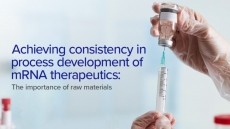Cell Therapy Manufacturing & Gene Therapy Congress
Kite talks audits, training and dry runs across CAR T supply chain

In October, Yescarta (axicabtagene ciloleucel) became the second chimeric antigen receptor (CAR) T cell therapy to be approved by the US Food and Drug Administration (FDA). The product was developed by Kite Pharma, which was acquired earlier this year for $11.9bn by Gilead Sciences.
And speaking at last week’s Cell Therapy Manufacturing & Gene Therapy Congress in Amsterdam, Prentice Curry, VP of quality and compliance at Kite, said unlike traditional pharma products, Yescarta does not involve multiple suppliers, manufacturers, fill/finish sites and wholesalers.
Get Yescarta
The product is made by isolating peripheral blood mononuclear cells, including T-cells, from the patient’s own white blood cells. These are then sent to a facility in El Segundo, California – which Kite opened in June last year – where they are stimulated to proliferate and transduced with a retroviral vector to introduce the CAR sequence into the patient’s T cells before being propagated in cell culture bags.
Once there are a sufficient number of cells available for infusion back into the patient, they are washed and frozen at the cell processing site before being shipped back to the clinical centre where they can be administered to the patient. The process takes an average of 17 days from receipt of the patient’s white blood cells.
“Those unit operations are very segregated, time-based, and take months to move [product] from one place to another. Pharma companies are not so involved with the therapy at that point out in the medical field; they sell the vials and then they are pretty much free from oversight,” he told delegates.
“But for cell therapies it’s quite different. On the positive side, the supply chain can be shorter with fewer steps, but you have a lot more responsibility all the way from the beginning to the end.”
To manufacture and administer autologous CAR T therapies, T cells need to be taken from a patient at specialised sites via apheresis, proliferated at what is usually a centralised manufacturing facility, then returned and administered into the patient within a very short and precise timeline.
And for a successful product, the apheresis sites have to be maintained and operated in a uniform manner, Curry said, as do the numerous administrative clinics.
Education, Accreditation, Administration
Back in October, a Gilead spokesperson told Biopharma-Reporter the firm is working to certify 16 clinics in 13 states for Yescarta, but an ultimately hopes to have 70 to 90 certified academic centers.
“We spend a great deal of time with the hospitals. They need to understand the therapies, they need to understand how to administer the therapies, they need to understand even basic things like the control of the frozen bag of cells,” Curry said, adding the regulators are very interested in these control strategies.
For Yescarta, Kite/Gilead sends its staff to oversee and educate its supply chain centres. “We audit the medical facilities, the apheresis and treatment centres, the nurses, the physicians which are going to be using this therapy. We have extensive training programmes as well with them.”
Curry added the firm also carries out dry runs to ensure nothing goes wrong at any part of the process.
“We ship bags filled with water and really test the whole process out before we authorise the centre.”
Furthermore, Kite/Gilead is working with non-governmental accreditation organisations he said, such as the Foundation for the Accreditation of Cellular Therapy (FACT) in the US, and JACIE in Europe to ensure quality and standardisation within its administration network.























